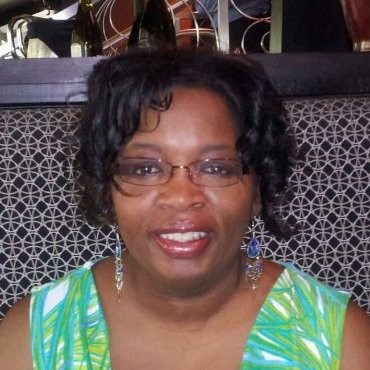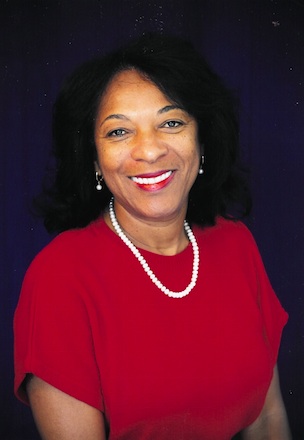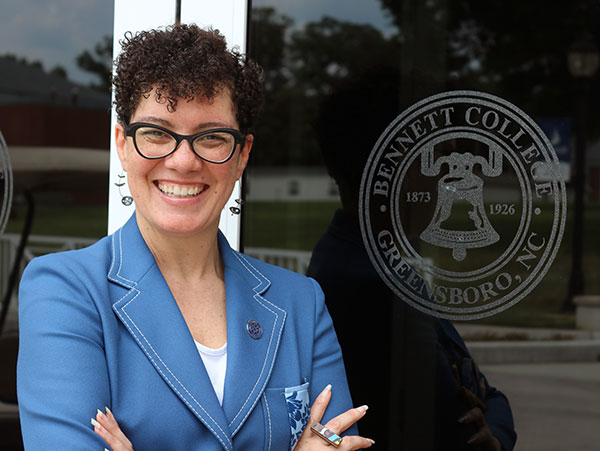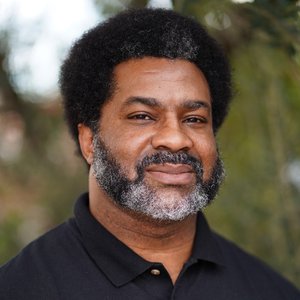ATLANTA—Historically Black Colleges and Universities (HBCUs) are pivoting themselves to better leverage technology, economics and their role in the community. Those were some of the major topics addressed at the United Negro College Fund’s (UNCF) UNITE 2022 Summit held in Atlanta.
Valora Richardson, director of Digital Solutions for UNCF’s Institute for Capacity Building, presented a new emerging platform she described as a “learning technology ecosystem” that would position HBCUs as leaders in online education.

As frequently quoted throughout the summit, HBCUs drive about 20 percent of Black graduates, 50 percent of Black lawyers and doctors and 25 percent of Black STEM (science, technology, engineering and mathematics) degree holders. Yet, HBCU endowments are seven times lower than predominantly White institutions on average, and the top White research universities receive more federal funding than all HBCUs combined. Covid-19 exposed how far behind HBCUs lag in online adoption, with only 20 percent of HBCUs offering online degrees.
Several HBCUs have had a tumultuous history with accreditation. Bennett College, an all-women’s HBCU in Greensboro, N.C., lost accreditation from the Southern Association of Colleges and Schools (SACS) in February 2019 but was reinstated due to a lawsuit the college filed. The college is now a member of the Transnational Association of Christian Colleges and Schools (TRACS), instead. In December 2002, SACS revoked accreditation from Morris Brown College in Atlanta. Almost 20 years later, in April 2022, the college was finally granted full accreditation again from TRACS.
By looking at some of the student barriers in terms of access to computers and high-speed internet as well as the training of faculty in latest management systems, “We realized that the existing online learning technology wasn’t built around the needs of our students and our faculty,” Ms. Richardson said.
She posed the question: “What if we gave HBCUs the tools and technology to lead the market in online learning, increase accessibility and improve student outcomes?”
The answer? HBCUv, a “shared online learning platform” built by HBCUs, for HBCUs. Nine HBCUs are helping to design and pilot the platform: Benedict College in Columbia, S.C.; Claflin University in Orangeburg, S.C.; Clark Atlanta University; Jarvis Christian University in Hawkins, Texas; Johnson C. Smith University in Charlotte, N.C.; Lane College in Jackson, Tenn.; Shaw University in Raleigh, N.C.; Talladega College in Ala., and Dillard University in New Orleans, La. The institutions will utilize the platform during its beta release in fall 2023.
The platform’s organizers partnered with Deloitte Digital’s Ethos division; a specialized team dedicated to developing breakthrough technologies.
The platform’s core principles are promoting Black excellence, creating Black futures, connecting Black talent, putting flexibility first, driving results with data, activating collective genius and exporting Black excellence to students across the globe.

According to the future design of the platform, it will include an interactive career finder quiz, program management and course registration, certificates and practicum courses, a centralized location for a student support team, online profiles and directory, live discussion, live event streaming, private and shared discussion channels, course module templates, virtual office hours, a classroom response system, real-time feedback, instructor feedback, a course matching algorithm, analytics for student performance, a student and faculty rewards program, a unified online library with database access and eBook checkout, and an intuitive resource center for academic help.
In a workshop about the platform, listeners asked at least 15 questions. Some of the questions related to student engagement: how students don’t want to be on screen via Zoom, how to keep students engaged on the platform and understanding the problem behind why students aren’t turning their cameras on.
Kat Dean, a consultant with Deloitte, and others with the organization responded by explaining possible features, including giving students that aren’t on camera a way to tell professors to go back or stop and a way for students to upload comments.
Another question was about student services such as counseling and tutoring. Ms. Dean said the idea is to integrate HBCUv with what institutions already have. Through the platform, faculty would be able to look at student pulse checks such as attendance and student feedback to get an idea on how students are doing mentally.

Another person asked: “This has to be really robust. The infrastructure has to be sound. Are you building this from scratch or partnering with a company to do this?”
Ms. Dean said they are looking at the technology, the data integration, data security, backend connections and government accreditation requirements. The design is a five-year version of the platform, she said. The team has been consulting with the nine pilot schools, doing in-person interviews and surveys and conducting design workshops.
Other questions addressed content, the onboarding of faculty and students and how student feedback would be received.
Ms. Richardson said they are looking at a shared revenue model to ensure the money is going where it belongs, back to the institutions. “We hope we raise enough money so that our institutions don’t even have to pay for HBCUv. That’s the big vision,” said Ms. Richardson.
Listeners had the opportunity to interact and propose their own ideas that the organizing team might incorporate in the future. Those ideas were LMS (learning management system) integration; virtual reality; models to support consistency in teaching practices; well-timed data collection; tapping into the alumni community; alumni chatrooms and forums; leveraging celebrities and other influencers within the Black community; providing affirmations; a hub for student organizations; invitation for elders to participate; Open room to allow students of different campuses to meet, talk and play cards; partnerships with companies that can provide jobs and internships; collaborations with local Black middle and high schools; professional development and training; portfolios; self-enrollment courses for self-interest; courses around the history of respective institutions; student content creation; therapy sessions; a marketplace and partnerships with Black bookstores.
Tamalyn L. Peterson, professor of English and faculty development coordinator for QEP (quality enhancement plan) implementation at Stillman College in Tuscaloosa, Ala., enjoyed a workshop session titled “digital solutions pioneering the metaverse.” They talked about virtual spaces that HBCUs need to engage with and how to simulate authentic HBCU experiences. During a dinner discussion, she took part in conversations on how there is no monolithic HBCU experience and how some of those experiences might be simulated virtually, which is what the team behind HBCUv is attempting to do.
“Each campus has what it does, what its traditions are, its legacy,” she told The Final Call.
She acknowledged that bolstering technology at all institutions is a priority.
“Given some of the discussions and conversations around HBCUs and the lack of resources, it’s important for us to have grants and external resources to supplement those areas. And so I think the whole notion of the digital divide, one of the questions that was asked in our session yesterday was how do institutions … facilitate students who don’t have access?” she said.
Stillman College has laptop initiatives to help with some of the barriers. Ms. Peterson noted the importance of being prepared to fulfill technological needs and also acknowledged that online, virtual or remote learning can be done successfully.

Economics and finance

Dr. Lisa Lang, provost and vice president for Academic Affairs at LeMoyne-Owen College in Memphis, Tenn., was drawn in by the summit’s finance workshops. One workshop was titled “Strategic Finance Institute—SACSCOC PRINCIPLES ON ACCREDITATION for Chief Financial Officers and Finance Staff.”
SACSCOC, or the Southern Association of Colleges and Schools Commission on Colleges, is the body for the accreditation of degree-granting higher education institutions in the Southern states, according to its website. The workshop covered Section 13 of its principles, which is on financial resources.
“When it comes to reaffirmation and accreditation with SACS, the number one standard that most people have trouble with is section or standard 13,” Dr. Lang said to The Final Call.
She said her hope was to garner information to take back to her campus and to also partner with other HBCUs.
During one discussion topic, a graphic presented how disparities exist in every dimension of Black economic life in the United States. Statistics included how 50 percent of Black workers are in jobs that pay less than $35,000 a year, only two percent of businesses are Black-owned and Black firms make 60 percent less revenue than White-owned firms. But despite HBCUs being in environments with lower job creation, graduates are two times more likely to move upward economically than other colleges.
Panelists spoke on the importance of “collective impact” and how a stronger, more well-funded HBCU network could produce a $10 billion increase in Black worker income, $1.2 billion in incremental business profit, a decrease of $300 million in student loan debt and an addition of $1 billion in consumer expenditures.

They defined “collective impact” as governments, corporations and public entities coming together to provide resources to HBCUs, including resources such as food and housing that would allow students to function in the classroom, as well as legislative work to close the gender and wage gap and the generational wealth gap.
They also discussed the inclusion of HBCUs “at the table.”
“It should be our table. Everybody else should be coming to our table,” said Suzanne Walsh, the president of Bennett College.
Panelists also addressed the frequently asked question: “Do we need all HBCUs?” They noted the intrinsic value and pivotal roles HBCUs play in communities.
“Do we ever get the question of do we need all of our PWIs?” questioned Dr. Dietra Trent, executive director of the White House Initiative on HBCUs.
Strengthening the Black educator pipeline
One way HBCUs are establishing themselves as pivotal to their communities is through K-12 advocacy. A summit workshop addressed the lack of Black teachers in K-12 schools. According to the National Center for Education Statistics, while 15 percent of public-school students were Black in the school year 2018-2019, only seven percent of teachers were Black in the school year 2017-2018, compared to 47 percent of White students and 79 percent of White teachers.
Workshop panelists discussed the role HBCUs play in recruiting and sustaining Black teachers.
Sekou Biddle, UNCF vice president for advocacy and programs, said one of the challenges in Black students not getting degrees is the lack of college readiness and preparation.
The panelists had different experiences when it came to seeing Black teachers in the classroom. Dr. Keeley Copridge, senior research associate for UNCF’s Frederick D. Patterson Research Institute, experienced Black teachers who had higher expectations for Black students. Rachel Maye-Haywood, intermediate interventionist at Wolf Creek Elementary School in College Park, Ga., had a Black track coach but didn’t have a Black teacher until she went to Spelman College in Atlanta.
The parents of Sharif El-Mekki, founder and CEO of the Center for Black Educator Development, were pro-Black revolutionaries and activists who didn’t separate education from activism. The parents of Kristina “Steen” Lyles, vice president of the equity and impact at DonorsChoose, graduated from HBCUs and became teachers.
“The power of seeing yourself in your teacher is real,” Ms. Lyles commented.
Ms. Maye-Haywood spoke on the misconception of what teaching is and why Black teachers are important.
“I also think that having people understand how important their presence is. So, not necessarily making someone feel like, ‘Ok, well I’m going to recruit you here, and you’re going to be our token African American,’” she said.

Mr. El-Mekki said another side of recruitment is a strong and robust retention plan instead of districts “running around” and “approaching it almost as if they’re on a safari.”
For Dr. Copridge, solutions include formalized practices focusing on paraprofessionals, alternative teaching programs and teachers intentionally wearing school-related t-shirts and handing out business cards.
“The thing about HBCUs, they’re not Black versions of predominantly White institutions,” Ms. Lyles expressed. “They are created for students of color, for Black students.”
She said teacher recruitment programs need to do the same thing by tailoring unique approaches to get Black educators in the door.
“Having a great teacher inspires a kid to want to become one,” she said.
She was involved in creating a database of over 500,000 teachers with about 100,000 non-White teachers. Through the database, she and others found that Black male teachers spend more hours mentoring students outside of class than any other demographic, and their students felt less burnt out as a result. HBCU graduates who were teachers had the most engagement of all.
Other panelist comments included Black educators providing cultural, intellectual, emotional and spiritual safety, the importance of students seeing themselves in classroom resources and study materials, how school districts can partner with HBCUs, and being brutally honest with students about the finances of teaching and the history of how tens of thousands of Black educators lost their jobs when schools started to become integrated.
Mr. El-Mekki commented that with integration, Black students became the new cotton.
“We’ll take the money because it’s tied to the Black child, but ain’t no money tied to the Black teacher so we ain’t taking them,” he expressed.
For him, “The purest form of activism is teaching Black children well.”
Because of the lack of Black teachers, high school students created the hashtag #WeNeedBlackTeachers.













